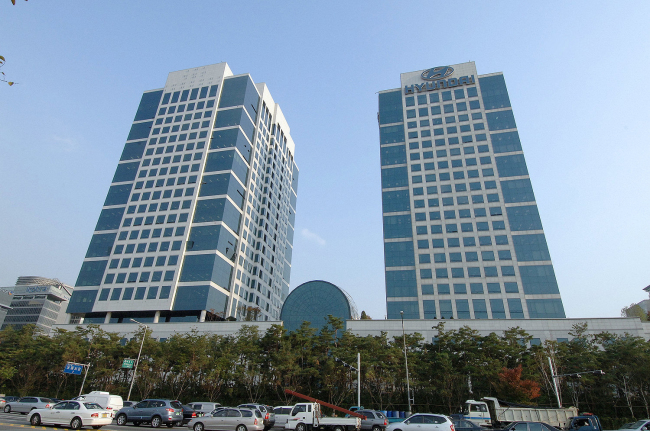Elliott’s demands seeking to unlock Hyundai’s capital draw mixed views
Some say US hedge fund’s move intended to boost share prices, others call it ‘reasonable’ request
By Cho Chung-unPublished : Nov. 14, 2018 - 16:27

The latest letter sent to Hyundai Motor by US hedge fund Elliott on Tuesday evening drew mixed views in the market Wednesday. Some are calling its requests reasonable, while others say it is intended to boost share prices for affiliates of the carmaker in which the hedge fund holds stock.
Elliott, the world’s largest activist hedge fund, ramped up its pressure on South Korean auto giant Hyundai Motor, demanding it return 12 trillion won ($10.6 billion) to shareholders, blaming the CEOs for mismanaging capital and thereby causing share price underperformance as well as lower-than-average returns.
Citing a report by Conway MacKenzie, an automotive consultancy, Elliott said Hyundai Motor is overcapitalized with “excess capital” ranging from 8 trillion-10 trillion won, as well as its parts-making affiliate Mobis with 4 trillion-6 trillion won. In the open letter, the hedge fund led by billionaire Paul Singer urged Hyundai Motor to return up to 8 trillion won, or 31 percent of its market capitalization, and urged Hyundai Mobis to return 4 trillion won, or 22 percent of its market value, to shareholders, “preferably in the form of share buybacks given the deep valuation discounts.”
It also called on it to sell land in Samseong-dong, southern Seoul, which the carmaker bought for 10.5 trillion won in 2014 to build its new headquarters, saying it has tied up valuable capital while research and development investment and capital expenditures remain below the industry average.
“Given the cost of delay and the lack of progress made thus far by the Group,” it said, “we reserve the right to put forward the various Conway MacKenzie recommendations, among other ideas, as shareholder resolutions in the next general meeting absent an appropriate response from (Hyundai).”
Demands from Elliott are nothing new, said Kang Sung-jin, an analyst at KB Securities. “(Elliott) is once again demanding that Hyundai Motor and Hyundai Mobis return excess cash to shareholders by suggesting an analysis by an independent consultancy,” he said.
Some industry watchers also suggested that Elliott is trying to boost the value of the stock it holds in three Hyundai affiliates before cashing out.
In April, Elliott said it holds a combined 1.5 trillion won worth of common shares in Hyundai Motor, Kia Motors and Hyundai Mobis. But the value of all three has nosedived recently. A Hyundai Motor share, for instance, was traded around 160,000 won in January, but plunged to 99,000 won last week. The share price of Kia Motors also declined from 34,000 won in February to 28,000 won this month.
With the chances growing that Elliott will lose money, the US fund appears to be seeking an alliance with other investors. “(Elliott) appears to be making a pre-emptive action to persuade shareholders and to take a favorable position in the general assembly, having Hyundai Motor’s announcement on governance reform in mind,” Kang said.
Hyundai pulled the plug on its governance reform plan in May in the face of fierce opposition from investors including Elliott. A plan B by the carmaker has not been announced yet, despite pressure from the Moon Jae-in government to improve transparency in its governing structure within this year.
Elliott’s demands, however, are considered a common gesture in advanced markets in the West, as management groups are often held responsible for depressing shareholder returns, according to some experts.
Bruce Lee, founder and CEO of Zebra Investment, said Hyundai Motor’s return on equity is lower than those of its peers, even lower than the growth rate of South Korea’s gross domestic product.
“Investors gave money so that the company (could) make investment and return profits. But as Hyundai’s capital efficiency is so low, (Elliott) is arguing that Hyundai’s management has been making misjudgments for years on the company’s investments,” he said, adding that Hyundai’s ROE rate was roughly 3 percent in the third quarter, lower than that of Toyota at 10 percent and Samsung Electronics at 15 percent.
He said Elliott’s complaints about Hyundai’s low ROE would not be disputable even for the National Pension Service, the largest institutional investor, which holds 8.44 percent of Hyundai shares.
“I don’t think Elliott is trying to boost its shares in Hyundai affiliates (for short-term profit making), their plan appears to be very strategic and is designed for long-term engagement.”
Hyundai Motor, meanwhile, has remained mum, saying there won’t be an official statement in response to Elliott’s letter to the board members.
Share prices of Hyundai Motor fell 1 percent at Tuesday’s close, while the value of Kia Motors rose 2.3 percent and Hyundai Mobis was up 1.88 percent.
By Cho Chung-un (christory@heraldcorp.com)






![[From the Scene] Monks, Buddhists hail return of remains of Buddhas](http://res.heraldm.com/phpwas/restmb_idxmake.php?idx=644&simg=/content/image/2024/04/19/20240419050617_0.jpg&u=20240419175937)








![[From the Scene] Monks, Buddhists hail return of remains of Buddhas](http://res.heraldm.com/phpwas/restmb_idxmake.php?idx=652&simg=/content/image/2024/04/19/20240419050617_0.jpg&u=20240419175937)

![[KH Explains] Hyundai's full hybrid edge to pay off amid slow transition to pure EVs](http://res.heraldm.com/phpwas/restmb_idxmake.php?idx=652&simg=/content/image/2024/04/18/20240418050645_0.jpg&u=20240419100350)

![[Today’s K-pop] Illit drops debut single remix](http://res.heraldm.com/phpwas/restmb_idxmake.php?idx=642&simg=/content/image/2024/04/19/20240419050612_0.jpg&u=)